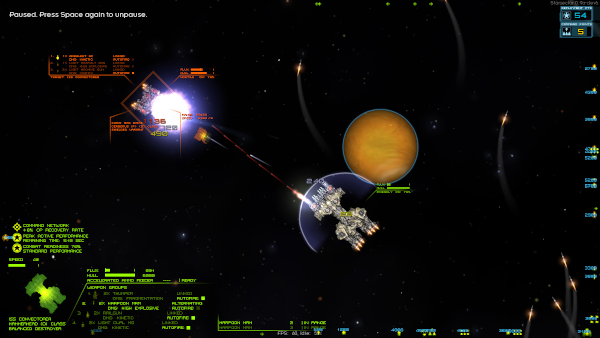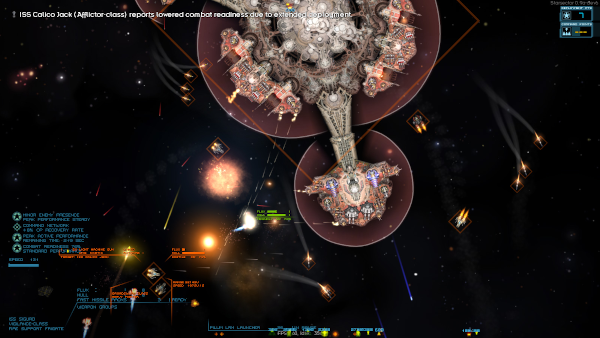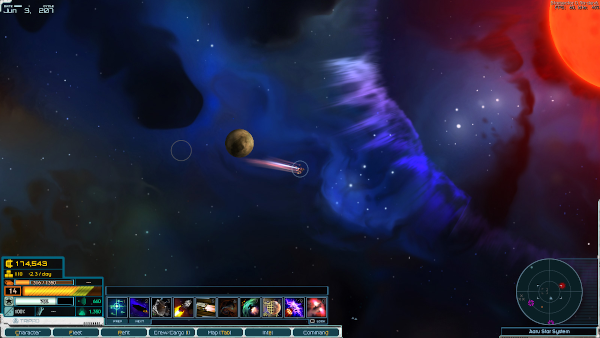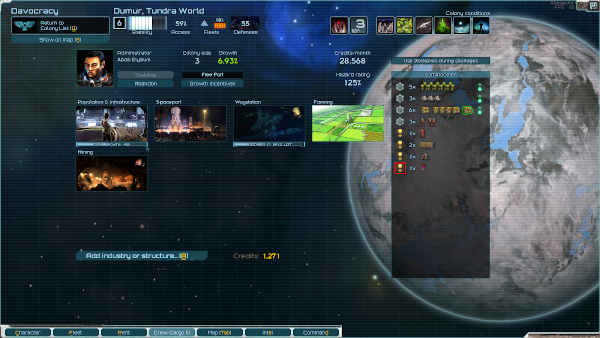EM: Freedom of play includes options like strengthening supply line security and helping encourage trade or weakening said supply lines to make piracy easier; given the use of procedural generation within the game, what kinds of influences and effects do these actions at specific locations have on the overall game universe? If I start looting every ship that passes through a given star system, will colonists/traders begin avoiding that route? Will my reputation as a scourge in one area influence interactions elsewhere?
AM: The game will respond to this, yeah – patrols will get stronger, while the colonies in that system will suffer from reduced accessibility, which will in turn cause other problems like shortages. The latter can also then be exploited for your profit, but can ultimately cause the colonies to become decivilized.
EM: Starsector has enjoyed a long development cycle and gone through a number of permutations (on the website, posts go back to November of 2010); with so many games being cranked out and tossed into the online game space these days, how do you see your work benefiting from the time you’ve invested in it? What mechanics and additions have come from the benefit of not being rushed?
AM: I think – perhaps obviously – more time gives you more of an opportunity to tune things until they feel right. One older example of this is the collision mechanics in combat. When one ship collides with another, the feel of that is, I think, extremely important in establishing how the player perceives the ships, making them feel like they have real weight. Fine-tuning that took a long time, and the result is something I’m happy with and that I think means a lot to the game – probably more than one might assume at first glance.
Plus, of course, the scope of the game is pretty large, so a key benefit of investing the time is being able to do it at all! I feel rushed pretty often (there’s just so much to do!); I just try not to let that interfere with how I approach the work. But to ship anything, concessions have to be made somewhere now and again.
EM: All games have to strike a balance between tasks asked of players, so can you give a breakdown regarding ship management, locations (like planets or space station) management, NPCs, equipment, battle, etc? Optimally, what do people spend most of their time doing, and how does this change throughout the game experience?
AM: Overall, the goal is to steer the player towards combat – the things you do outside combat give it context and consequences (which makes it feel meaningful), but then also steer you into combat, so it’s a cycle. For example, when you establish a colony, you’ll likely have to fight to keep it safe. When you accept a delivery contract, it’ll likely point you to an area where there’s pirate activity. And so on.
But for a lot of things, it’s up to the player. For example, you can spend a lot of time outfitting ships, perfecting your loadouts and running multiple simulations to test them. Or you can use the “autofit” feature to create something that, while not optimal, will certainly do the job. Colonies in particular don’t require a lot of management – you make high-level decisions (which industries and structures to build, or where to even build the colony in the first place) but you don’t need to worry about their execution planetside.
EM: You’re including mod support as a visible part of your work, and I’m interested in your view of user-created content. Some games in recent history, like Shadowrun Returns, spawned a huge level of interest from an enthusiastic community using the level editor tools, and other games have been fairly closed to such endeavors. How do you see games like yours benefiting from mods, and when does a project transition from being a game to being a story creation tool?
AM: Mod support was important to me from the beginning – it’s something I really enjoyed as a player (especially for the TES games), so it was and is a priority. I think it’s hugely beneficial, too – the time between updates can get a bit long, and mods help fill in the gaps. Plus, I don’t think the community around the game would be anywhere near what it is if it wasn’t for the amazing efforts of modders.
It’s kind of like… if you look at Minecraft, why is it popular? Pretty much because it lets people be creative, and of course people want to talk about and share their creations, and it keeps the game going. Of course the bar is higher for modding, but I think there’s the same kind of effect. I’m just thankful that some tremendously talented people have decided to use Starsector to express their creativity.
The game is still the game first and story creation tool second, but when one gets into the right mindset, it’s possible to build a lot of flexibility into the game engine… not for free, exactly, but without a huge amount of effort. I think I’ve gotten better about it over the years – some of the things that are tougher to mod involve older code, while the newer stuff is much more flexible out of the gate.
EM: The game is currently available for preorder, with alpha versions available; given the current status of the project, what kinds of requests have you been getting from players and fans? Do people simply clamor for more content, or are people digging into lore, focused on mechanics, rare bugs, etc?
AM: It’s a mix of everything, but the most common one is for more story content, missions, and so on. Which makes sense, since that’s the least-developed part of the game right now! But now most of the groundwork has been laid, and work on precisely that is in progress right now. I’m excited about finally moving forward on the story elements, as it’s something I’ve literally been looking forward to for many years.








































